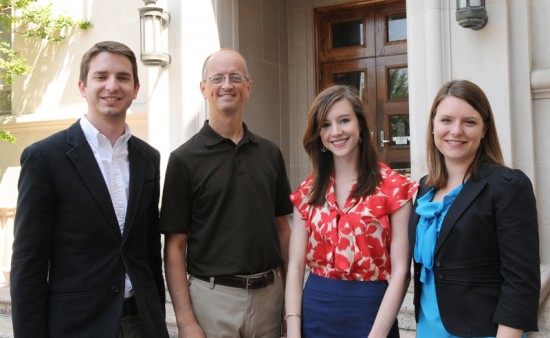
From right to left, Thad T. Hutcheson 1L Moot Court Competition Champion Michael Kelso, Kelso's legal writing instructor Wayne Schiess, Hutcheson Competition finalist Courtney Johnson, and Johnson's legal writing instructor, Stacy Rogers Sharp.
On April 23, 2012, the Law School hosted the final round of the 2012 Thad T. Hutcheson 1L Moot Court Competition in the Eidman Courtroom. Finalists Michael Kelso and Courtney Johnson argued before a venerable panel of jurists including Justice Melissa Goodwin of Texas’s Third Court of Appeals; Judge Jim Coronado, a 1978 UT Law graduate presiding in the 427th Criminal District Court, Travis County; U.S. Magistrate Judge Mark Lane, recently appointed to the Western District of Texas, Austin Division; Judge Tommy Broyles, administrative law judge and adjunct professor at the Law School; and the Law School’s Loomer Family Professor in Law, John Golden.
This year’s moot court problem, tackled by all incoming students this year in their spring legal writing course, involved an issue of first impression for the Supreme Court of Oregon. Oregon, like many other states, recognizes that attorneys have an absolute privilege to publish defamatory material if it is “relevant to” and “connected with” a judicial proceeding. But the limits of that privilege beyond the clear confines of formal litigation are unclear. Attorney Lewis “The Avenger” Adamson had distributed fliers that looked suspiciously like an advertisement, purportedly, to find witnesses for a pending negligence suit filed on behalf of an injured camper. In the flier, Adamson listed injuries to children, including events that had never been alleged to have happened at the Oregon summer camp. After experiencing a dramatic decline in enrollment, Camp Whitewater sued Adamson for unfair trade practices. Adamson argued that an attorney’s “absolute privilege” provided him with an affirmative defense to the camp’s lawsuit as a matter of law. The trial court agreed, and the court of appeals affirmed. In the moot appeal, Petitioner Camp Whitewater asked Oregon’s Supreme Court to reverse the affirmance of the order granting summary judgment to respondent Adamson based on the absolute privilege defense.
The Hutcheson Competition was established in 1987 as a result of the endowment of the esteemed alumnus for whom the competition is named. Sixty-four members of the 1L class compete to participate in this single-elimination tournament each year. This year’s champion was Michael Kelso, who graduated from UCLA in 2010 with a BA in history and international development studies. Kelso participated in the national championship mock trial tournament as an undergraduate. The finalist was Courtney Johnson, who graduated Phi Beta Kappa from the University of North Carolina at Chapel Hill, where she studied economics and international studies. Semifinalists were Michelle Arishita and Brian Young; and quarterfinalists were Phil Harris, Jeff Kitchen, Amanda Mendiola, and Andrew Quecan. Georgia Jolink, ’12, served as the Student Competition Director.
The competition depends each year on the generous contributions of many alumnae, local attorneys, and judges who volunteer their time to judge the competition. This year the law firms of Fulbright & Jaworski LLP and Andrews Kurth LLP contributed attorney-judges for multiple rounds. The Law School’s legal writing faculty designed the original moot court problem and administered the competition. Those faculty members include: Director Wayne Schiess; Robin Meyer, ’88; Kamela Bridges, ’91, who was principally responsible for the problem’s design; Beth Youngdale, ’92; Sean Petrie; Elana Einhorn, ’89; Stacy Rogers Sharp, ’06; Gretchen Sween, ’03; and Christine Payne, ’06.
